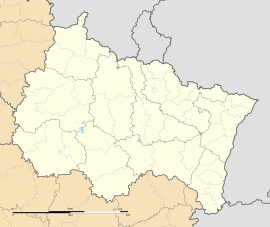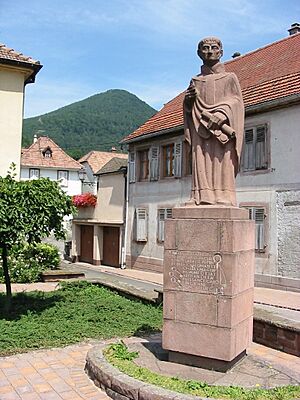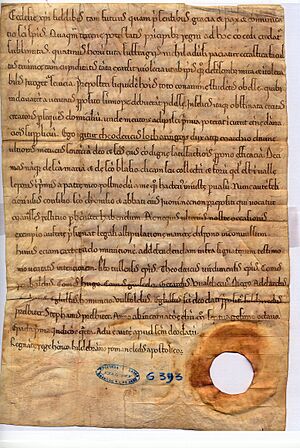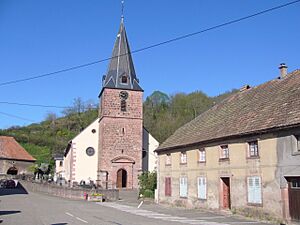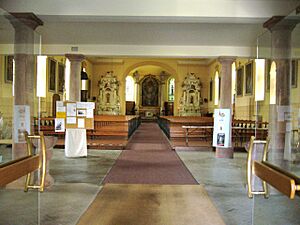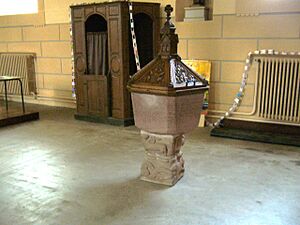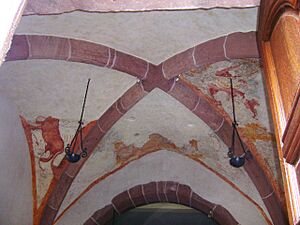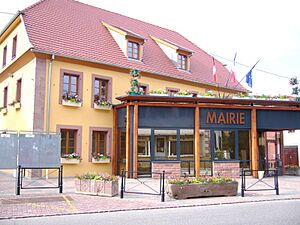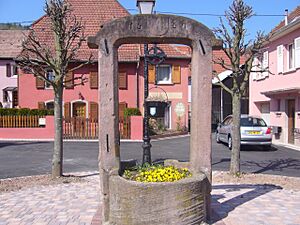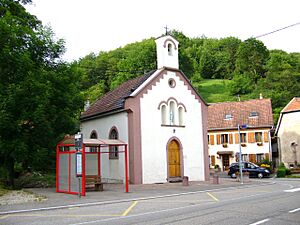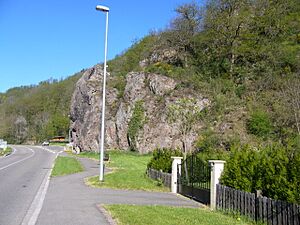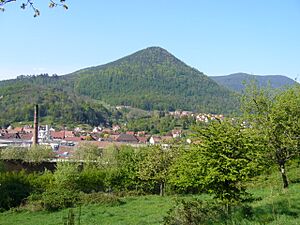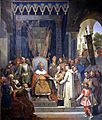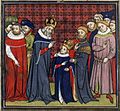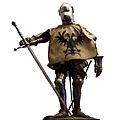Lièpvre facts for kids
Quick facts for kids
Lièpvre
|
||
|---|---|---|
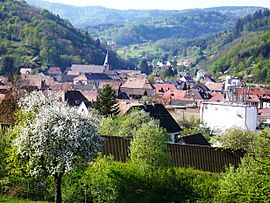
Lièpvre seen from Hoimbach
|
||
|
||
| Country | France | |
| Region | Grand Est | |
| Department | Haut-Rhin | |
| Arrondissement | Colmar-Ribeauvillé | |
| Canton | Sainte-Marie-aux-Mines | |
| Intercommunality | Val d'Argent | |
| Area
1
|
12.55 km2 (4.85 sq mi) | |
| Population
(2006)
|
1,770 | |
| • Density | 141.0/km2 (365.3/sq mi) | |
| Time zone | UTC+01:00 (CET) | |
| • Summer (DST) | UTC+02:00 (CEST) | |
| INSEE/Postal code |
68185 /68660
|
|
| Elevation | 234–930 m (768–3,051 ft) (avg. 275 m or 902 ft) |
|
| 1 French Land Register data, which excludes lakes, ponds, glaciers > 1 km2 (0.386 sq mi or 247 acres) and river estuaries. | ||
Lièpvre is a small town, also called a commune, located in eastern France. It's found in a part of France called the Haut-Rhin department. About 1,770 people live there.
Contents
About Lièpvre
Lièpvre is a charming commune in the Alsace region of France. It sits in a beautiful valley, surrounded by hills and forests. The town is known for its quiet atmosphere and historical buildings.
Where is Lièpvre?
Lièpvre is located in the Haut-Rhin department. This area is in the eastern part of France. It's close to the border with Germany. The town is nestled in the Val d'Argent, which means "Silver Valley." This name comes from the silver mines that used to be in the area.
What is a Commune?
In France, a commune is like a small town or village. It's the smallest unit of local government. Each commune has its own mayor and local council. They manage things like schools, roads, and local services. Lièpvre is one of many communes in France.
Lièpvre's History
Lièpvre has a long and interesting history. It dates back many centuries. The area was important because of its location and natural resources.
Early Times
The history of Lièpvre is linked to important figures. One such person was Fulrad, a famous abbot. An abbot is the head of a monastery. Fulrad lived in the 8th century. He was an advisor to Charlemagne, a very powerful emperor.
Fulrad helped to develop the area around Lièpvre. He founded a priory there. A priory is a type of monastery. This priory was important for the local community. It helped to spread Christianity and education.
Medieval Period
During the Middle Ages, Lièpvre continued to grow. The area was known for its mining activities. Silver and other metals were found in the nearby mountains. This brought wealth and people to the region.
The town also saw changes in power. Different dukes and lords ruled the area. In 1078, Thierry II, the Duke of Lorraine, made an important decision. He restored certain rights and markets to Lièpvre's priory. This helped the town to prosper.
Important Buildings
Lièpvre has several old and interesting buildings. They show the town's long history.
The Church of Notre Dame de l'Assomption
The main church in Lièpvre is called Notre Dame de l'Assomption. It's a beautiful building with a long history. The church has a bell tower. An old bell from 1542 is still there.
Inside the church, you can see old features. There's a baptistery, which is a place for baptisms. There are also frescoes from the 13th century. Frescoes are paintings on walls or ceilings.
The Town Hall
Lièpvre also has a town hall. This building is where the local government works. It's an important place for the community.
Old Fountain
There is an old fountain in Lièpvre that dates back to 1550. It's a historical landmark.
Chapel of Musloch
Another interesting building is the Chapel of Musloch. It's a small chapel located in Lièpvre.
Nature and Scenery
Lièpvre is surrounded by natural beauty. The area has hills and rock formations.
Rocher du Violons
Near Lièpvre, there is a rock formation called Rocher du Violons. It's a notable natural spot.
Chalmont
Chalmont is another prominent hill or peak in the area. It offers views of the surrounding landscape.
Images for kids
-
Boniface's statue of (Mainz)
-
Charlemagne, surrounded with his main officers, receives Alcuin who presents his manuscripts, works of his monks.
-
Charlemagne and his son Louis the Pious
-
Charlemagne's portrait paints by Albrecht Dürer
See also
 In Spanish: Lièpvre para niños
In Spanish: Lièpvre para niños




